| Srl | Item |
| 1 |
ID:
087410
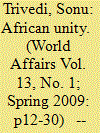

|
|
|
|
|
| Publication |
2009.
|
| Summary/Abstract |
It has become imperative for Africa to map out a starategy ogf regional cooperation and integration and lay the foundation for sustainable development. The establishment of AU is a step in that direction. It aims at achieving greater unity and solidarity and accelerating the political and socio-economic integration of the continent.
|
|
|
|
|
|
|
|
|
|
|
|
|
|
|
|
| 2 |
ID:
060981


|
|
|
|
|
| Publication |
Mar 2005.
|
| Summary/Abstract |
This article reviews western donor support for building African peace and security architecture, specifically in relation to G8 efforts to engage in the capacity-building process in line with commitments made in the Joint Africa/G8 Plan to Enhance African Capabilities to Undertake Peace Operations (the Joint Plan) agreed between G8 and key African leaders at the G8 Summit in Evian in 2003. It describes a project by the New Security Issues Programme at Chatham House, carried out jointly with the Peace and Security Programme at the United Nations Association-UK and the Institute for Security Studies in Pretoria, to provide strategic input into implementing the Joint Plan. The article outlines the background to western involvement in peace and security capacity-building in Africa, the nature and current status of the African peace and security architecture and some key challenges to the G8/Africa capacitybuilding process particularly African institutional human resource capacity and coordination among the various players involved. Finally, it maps out potential priorities for future progress in taking the capacity-building process forward.
|
|
|
|
|
|
|
|
|
|
|
|
|
|
|
|
| 3 |
ID:
117798


|
|
|
|
|
| Publication |
2012.
|
| Summary/Abstract |
When future historians consider the global governance role of the G8, they would do well to consider its approach to Africa. For the first decade of the new millennium, G8 summits sustained an extraordinary focus on the continent. Responding to African governments' proposed New Partnership for Africa's Development (NEPAD), G8 governments produced a succession of agreements and initiatives, anchored by the 2002 Africa Action Plan and the 2005 Gleneagles declaration on Africa and development. These initiatives were framed by a motif of "partnership." They provided elite impetus toward a more comprehensive "Third Way" bargain for Africa. Collectively, they illustrate some stark limits to designs for a transnationally hegemonic approach to global challenges. In consequence, they have contributed to the erosion of G8 purpose and legitimacy.
|
|
|
|
|
|
|
|
|
|
|
|
|
|
|
|
| 4 |
ID:
052912


|
|
|
| 5 |
ID:
095177
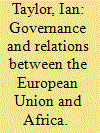

|
|
|
|
|
| Publication |
2010.
|
| Summary/Abstract |
The New Partnership for Africa's Development (NEPAD) was launched in 2001 as the pre-eminent vehicle to promote Africa's recovery. Initially it was enthusiastically promoted by a select number of countries in Africa, as well as by key members within the G-8. The European Union was active in its support, particularly vis-a-vis governance issues, stating that the EU 'finds that Africa's development efforts are best served by a greatly sharpened focus on NEPAD as the basis for partnership between Africa and the international community'. However, there have been significant problems facing NEPAD. These revolve around the actual extant political economy and dominant political cultures across Africa, which the technocratic neoliberal agenda of 'good governance' cannot deal with. Furthermore, the rise of Chinese engagement with Africa adds a major difficulty to Brussels' claim to be a key engine in supporting NEPAD's goals regarding governance and development. Indeed, the emergence of Chinese actors in Africa threatens to make much of the EU's policies on governance largely irrelevant, although it is acknowledged that, in the long term, Beijing's policy interests are not served by chaotically ruled states.
|
|
|
|
|
|
|
|
|
|
|
|
|
|
|
|
| 6 |
ID:
060621


|
|
|
| 7 |
ID:
057169
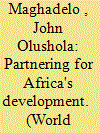

|
|
|
| 8 |
ID:
057212
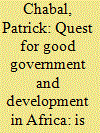

|
|
|
| 9 |
ID:
118658
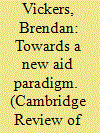

|
|
|
|
|
| Publication |
2012.
|
| Summary/Abstract |
As the largest African economy and the leading African aid-provider, with plans to establish an aid agency, South Africa is often ranked among the developing world's 'emerging donors'. However, the country's development cooperation commitments are smaller in scope, scale and ambition than the aid regimes of the BRIC (Brazil, Russia, India, China) or Gulf state donors. Given its limited resources and domestic socioeconomic challenges, South Africa prefers the role of 'development partner'. In this role, South Africa's development cooperation in Africa has ranged from peacekeeping, electoral reform and post-conflict reconstruction to support for strengthening regional and continental institutions, implementing the New Partnership for Africa's Development (NEPAD) and improving bilateral political and economic relations through dialogue and cooperation. This article seeks to determine whether Pretoria's development cooperation offers an alternative perspective to the aid policies and practices of the traditional and large rising donors. We conclude that South Africa does not fit neatly the 'donor' category of the Organization for Economic Cooperation and Development's (OECD's) Development Assistance Committee (DAC) and neither is Pretoria's aid-spending typically 'ODA' (official development assistance). Instead, with its new aid agency, South Africa occupies a unique space in Africa's development cooperation landscape. With fewer aid resources, but a 'comparative advantage' in understanding Africa's security/governance/development nexus, South Africa can play an instrumental role in facilitating trilateral partnerships, especially in Southern Africa.
|
|
|
|
|
|
|
|
|
|
|
|
|
|
|
|